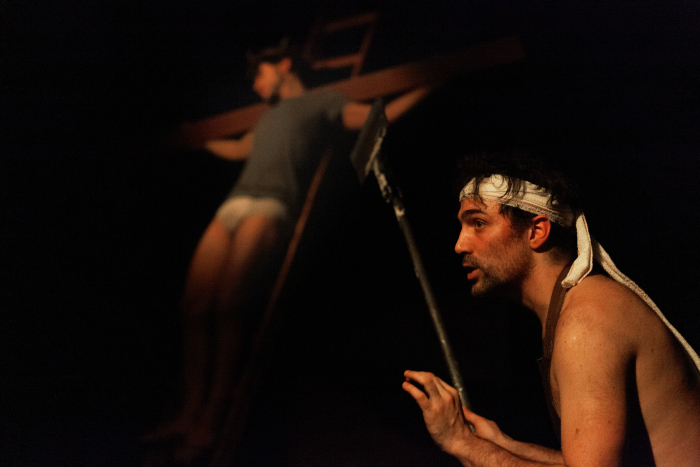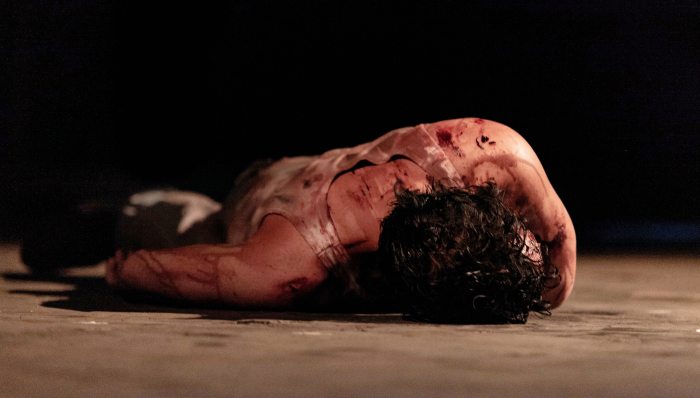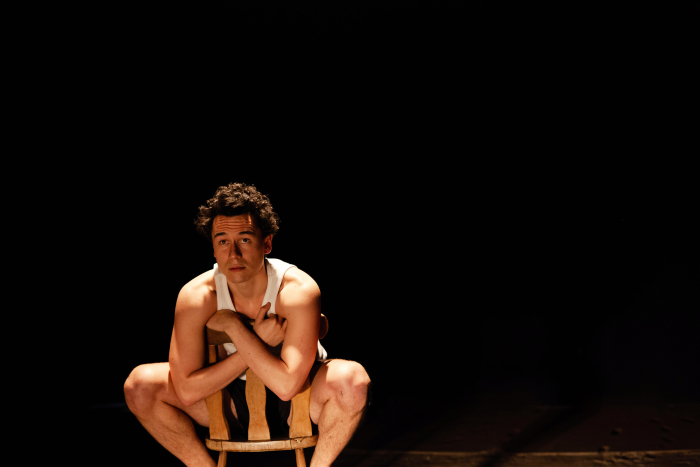FRArt Corsair Research. Theater research based on Pier Paolo Pasolini’s Corsair Writings and Lutheran Letters
- is created by Eva Zingaro-Meyer
- is created by Ferdinand Despy
- is created by Justine Lequette
- is created by Simon Hardouin
1. Corsair research: introduction
- uses data from Corsair research: biographies
- type: Article
- ref: DOC.2021.188
In 1975, shortly before his death, Pier Paolo Pasolini published Corsair Writings, a collection of articles that had originally appeared in Italian newspapers, and Lutheran Letters, a “brief pedagogical treatise.” With the weapons of polemic and contradiction in hand, the poet and filmmaker depicted in these two works a society that had been profoundly altered through its subjection to mass consumption and deculturization. After graduating from the Liège Conservatory, Ferdinand Despy, Justine Lequette, Eva Zingaro-Meyer, and Simon Hardouin focused their attention on these texts with the goal of staging this refractory vision, whose political and social demands still press on us uncomfortably in the present day.
The four researchers began their work sitting together around the table, reading, studying and discussing Pasolini’s biography and theater works, the work of Antonio Gramsci, and the history of Italy, among many other topics. This enabled them to situate their material in its ideological, social, and cultural context. They then transitioned “to the stage” through a series of residencies, in which they were able to gradually iron out the various kinks of working together, ultimately arriving at a truly collective dynamic and common language.
Their theater research revolved mainly around two questions: how to stage this complex thought, and how to use the tools of theater to evoke the disappeared world that Pasolini evoked, often with great nostalgia, in his writings? The researchers responded at first by working on traditional Italian songs in collaboration with Brigitte Romano. They also engaged in artistic research into the farmer, proletarian, and sub-proletarian figures in Pasolini’s films, together with visual artist and costume designer Elsa Seguier-Faucher. The initial attempts to concretize these notions led them quickly to place these songs and figures at a distance, as a way to deal with the cultural and temporal separation between these forms and the four members of this collective. But rather than generate a sense of failure, these difficulties in bringing Pasolini’s thought to the stage ultimately formed the basis of a self-referential performance with the working title “For one night: notes for a future performance.”
Even though the pandemic and lockdown did not greatly affect the timeline they had given themselves, the changed circumstances also opened up new perspectives for the project, namely the creation of an artwork for the Biennale de l’Image Possible, in collaboration with Le Corridor, and a new documentary project based on a series of preliminary interviews that the group had conducted with senior citizens who were witnesses to the “world from before” that Pasolini evoked. These documents are slated to soon become a sound work.
2. Corsair research
- has as creator Eva Zingaro-Meyer
- has as creator Ferdinand Despy
- has as creator Justine Lequette
- has as creator Simon Hardouin
- type: Image
- ref: DOC.2021.191

- Ferdinand Despy and Simon Hardouin. Stage work during the residency at the Liège Theater, Rocourt, February 2020. Photo credit: Annah Schaeffer.
- ©AnnahSchaeffer-6.jpg
- image/jpeg
- 2.5 MB
- download
3. Corsair research
- has as creator Eva Zingaro-Meyer
- has as creator Ferdinand Despy
- has as creator Justine Lequette
- has as creator Simon Hardouin
- type: Image
- ref: DOC.2021.192

- Justine Lequette. Stage work during the residency at the Liège Theater, Rocourt, February 2020. Photo credit: Annah Schaeffer.
- ©AnnahSchaeffer-7.jpg
- image/jpeg
- 5.49 MB
- download
4. Corsair research
- has as creator Ferdinand Despy
- has as creator Justine Lequette
- has as creator Simon Hardouin
- has as creator Eva Zingaro-Meyer
- type: Image
- ref: DOC.2021.193

- Ferdinand Despy. Stage work during the residency at Arsenic2, Herstal, October 2019. Photo credit: Annah Schaeffer.
- ©AnnahSchaeffer-2.jpg
- image/jpeg
- 2.1 MB
- download
5. Corsair Research
- has as creator Ferdinand Despy
- has as creator Justine Lequette
- has as creator Simon Hardouin
- has as creator Eva Zingaro-Meyer
- type: Image
- ref: DOC.2021.194

- Ferdinand Despy. Stage work during the residency at Arsenic2, Herstal, October 2019. Photo credit: Annah Schaeffer.
- ©AnnahSchaeffer-1.jpg
- image/jpeg
- 759.37 KB
- download